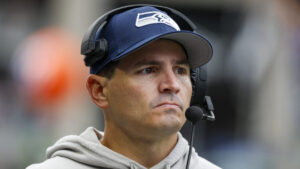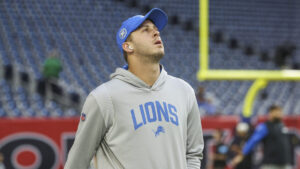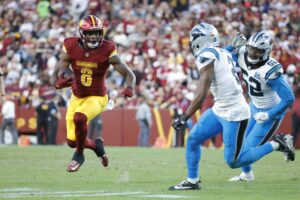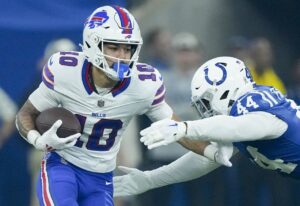The NFL of old was a different breed than what which has become normal today. It was characterized by tough defense, gritty field position battles, and a ground-and-pound offensive style. Running backs were perhaps the most essential part of the offense. Nowadays the on field product we have grown accustomed is a pass-happy offense where the running back had faded into a sort of insignificance. At least, that’s the way it was until the past few draft classes injected undeniable talent at the running back position into the league.
NFL Running Game Resurgence: Young Backs Changing the Game
One could argue that the NFL running game resurgence all started with Todd Gurley. In a then surprising move, the Los Angeles Rams selected him with the 10th overall pick in the 2015 NFL Draft. This marked the first time since 2012 that a running back had gone in the first round, let alone in the top 10. Gurley has since kicked off a “running back revolution” of sorts. As a rookie, he ran his way to 1,106 yards and 10 touchdowns, all in just 13 games. The league took notice of his success.
In the subsequent draft, the Dallas Cowboys pulled the trigger on Ohio State product Ezekiel Elliott at number four overall. Elliott responded by setting the league on fire. He took the rushing title as a rookie with his 1631 yards and topped it off with 15 touchdowns.
The Dallas Cowboys rode the wave of the combined success of Elliott and fellow 2016 Cowboys selection quarterback Dak Prescott all the way to a division title and playoff berth. As if the success of Gurley wasn’t enough to put the league on notice that running backs were back in style, it seems that the monster numbers Elliott put up convinced them. In the 2017 NFL Draft class, the running back was more prominent than ever before. And oh was it ever a sight to behold in this NFL season.
The Historic 2017 Running Back Class
The running back class from the 2017 NFL Draft has been like anything previously witnessed. It has proven to be deep and absolutely packed with potential star power. Names like Leonard Fournette, Christian McCaffrey, Kareem Hunt, Alvin Kamara, Joe Mixon, and Dalvin Cook headline the class’s big ticket potential. Five of six teams who landed big ticket running backs are in the playoffs this year. Coincidence? Perhaps not. Each back opened up a new dimension in his team’s offense and allowed them to soar to new heights.
Again this year the number four overall slot went to a running back. The back drafted here this year was LSU product Leonard Fournette. In college he was one of the most talented and intimidating backs in the game, and he didn’t falter at all in the pros. The gifted 6’0 tall 228 pound power back amassed 1040 yards and nine touchdowns, not to mention his 302 yards receiving. His prowess as a runner alleviated some of the pressure from a struggling Blake Bortles, allowing him to have perhaps his most efficient year of his career. Bortles threw just 13 interceptions, a career low and three less than previous best 16 thrown.
Stanford’s own Christian McCaffrey added an element to the Panthers offense they haven’t known in years. His gifted route running skills and abilities as a receiver gave quarterback Cam Newton an incredibly valuable weapon. While he didn’t do much as a rusher, he led his team in receptions by a wide margin with 80 and was second in both receiving yards and touchdowns. On a team severely lacking dynamic playmakers, McCaffrey supplies just that.
This year’s rushing title went to a rookie for the second consecutive year. This year it went to none other than first year Kansas City Chiefs running back Kareem Hunt, an underrated talent from Toledo. His 1,327 yards led the league and paved the way for a reborn Chiefs offense. Alex Smith had an MVP worthy year with his 4,042 yards, 26 touchdowns, and just five interceptions. Being surrounded by weapons like tight end Travis Kelce and speedster Tyreek Hill certainly played a big part, but having a talented runner like Hunt to take defenses’ focuses away from them was crucial.
The New Orleans Saints Alvin Kamara was a true deadly, do-it-all weapon. He was second on his team in rushing yards (728), rushing touchdowns (eight), receptions (81), receiving yards (826), and tied for the lead in receiving touchdowns (five). His impact was felt on every facet of the New Orleans offense and helped to make it one of the most deadly in the NFL.
The Minnesota Vikings rookie back Dalvin Cook looked incredibly promising in the brief action he was afforded. Before tearing his ACL in just week four of his rookie campaign, Cook had already racked up 354 yards and a pair of touchdowns. His dazzling talent has everyone involved with the Vikings excited for what the future of the offense holds with Cook back and healthy.
Main Image:






